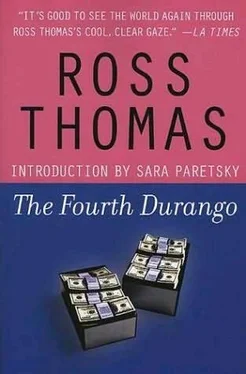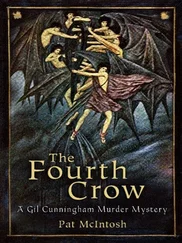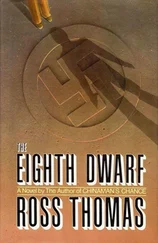Vines closed his eyes and said, “Which doctor did you talk to?”
“Pease. He thinks Dannie’ll do just fine as long as we keep sending the six thousand a month. When I asked him what would happen to her if the money ran out, he said he’d see that she was placed in one of the state’s better mental hospitals where they might keep her for a week or ten days. I believe I told him Dannie wouldn’t make a very good bag lady.”
“No,” Vines said, opening his eyes, “she wouldn’t.” He drummed the fingers of his right hand on the steering wheel and asked, “Anything left in the tube?”
“Sure,” Adair said and passed it to him.
Vines had another swallow of bourbon, coughed and passed the glass tube back to Adair. “So you think there’s no possible connection between her and Soldier Sloan?”
“None,” Adair said.
“Then Dannie’s obviously not the DV in Soldier’s ‘C JA O RE DV.’”
“Obviously.”
Vines again drummed his fingers on the steering wheel as he stared out at the night that began just beyond the Mercedes’s three-pointed star atop the radiator. Finally, he stopped the drumming and said, “What about Venable?”
“Who?”
“Dixie Venable.”
Adair bit his lower lip to keep from gaping, then opened his mouth just wide enough to say, “Jesus. Her maiden name.”
“And the name Soldier first knew Dixie by.”
Adair looked at Vines with total suspicion. “When did all this dawn on you?”
“Just now,” Vines said.
“Who do we share this brilliance with?” Adair asked. “Dixie’s sister? Her husband? Maybe with the chief of police?”
“With nobody,” said Kelly Vines.
When Virginia Trice came over to their booth and said, “You got a call,” Vines was drinking a draft beer and eating a bowl of chili that he thought had too much cumin in it and not enough chili pepper. Adair, his mouth full of a bacon, lettuce and tomato sandwich, shrugged helplessly at Vines, who asked, “Who’s got a call?”
“Either one of you.”
“Who’s calling?”
“He wouldn’t say,” Virginia Trice replied, turned and went back to preside over the bar.
When Vines reached the bar, she had already moved the phone down to a spot in front of the last stool, which was four stools away from the nearest customer. Vines nodded his thanks, picked up the phone and said hello.
“Mr. Adair?”
“This is Vines.”
“Good. It is I, Parvis Mansur.”
“Right.”
“I’m calling from a pay telephone in Santa Barbara so please bear with me should I have to drop in more quarters.”
“How’d you know we were here?”
Vines could hear Mansur’s deep sigh. “Logic and luck. This is the fourth number I’ve called.”
“Just curious.”
“Did Dixie give you and Mr. Adair my message?”
“Yes.”
“Did you inform B. D. and Sid?”
“Yes.”
“Good. Approximately twenty-one minutes ago I received a call on my secure line, which obviously is no longer secure, hence this call from a pay telephone.”
Wondering when he last had heard anyone say “hence,” Vines said, “This call was from the same person?”
“Yes. This time a date was proposed or rather, I should say, insisted upon.”
“When?”
“Four July. Is that satisfactory to you and Mr. Adair?”
“The date’s okay. What about the place?”
“As we discussed, it must be a place to which, logically, the two of you could be lured. By that, I mean, it can’t be under a tree in the middle of nowhere.”
“Right.”
“Do you have a suggestion? If not, I do.”
Vines already had given considerable thought to where he and Adair were to be sold for $1 million. The place he had in mind featured a back door with an aluminum core sheathed in steel, but after deciding it would be prudent to listen first to Mansur’s proposal, he said, “What do you suggest?”
“Cousin Mary’s, primarily because of its location and its excellent security.”
“Sounds okay.”
“Good. I’m glad you agree.”
“Who called you, Parvis?” Vines said, using Mansur’s given name for the first time.
“The same man called both times. Obviously an American with a rather reedy tenor voice and no regional accent-at least none I could detect.”
“How’d he get your phone number?”
“I thought it best not to ask.”
The telephone buzzed and a recorded operator’s voice interrupted, requesting the caller to deposit an additional fifty cents. Vines listened to the quarters clank down into the pay phone. When the clanking was over, Mansur said, “Are you still there?”
“Still. Did you talk to him about the price?”
“Yes, of course, and he agreed to it with a minimum of grumbling.”
“No serious bargaining?”
“None.”
“That’s strange.”
“I thought so, too, which is why I stressed there would be no sale until the exact, specific amount was confirmed.”
“Until you’ve counted the money?”
“In essence, yes.”
“What’d he say?”
“He said no problem.”
“Anything else?” Vines asked.
“Did Dixie by any chance say where she was going after she left you?”
“When I last saw her she was with her sister.”
“Good,” Mansur said, sounding relieved. “That’s splendid. You might call B. D. and Sid and inform them of these new developments.”
“All right.”
“Good night then, Mr. Vines.”
“Good night,” Vines said, broke the connection with a forefinger, caught Virginia Trice’s eye and used a nod to invite her down to his end of the bar.
“You have the mayor’s home phone number?” Vines asked.
“It’s unlisted.”
“I know.”
Virginia Trice looked up at the ceiling, back down at Vines and recited the number from memory. After Vines thanked her and began dialing, she moved farther up the bar.
The mayor answered with a hello halfway through the call’s third ring.
“This is Kelly Vines.”
“You must have the wrong number,” B. D. Huckins said and hung up.
After hanging up on Vines, the mayor returned to her chocolate-brown leather easychair and smiled an apology at Sheriff Charles Coates, who perched on the edge of the cream 1930s couch, a cushion away from Sid Fork.
Sensitive about his average height, which he felt insufficient by southern California standards, the forty-two-year-old sheriff’s backside rarely occupied more than six inches of anything it rested on. He usually sat as he sat now, leaning a bit forward, hands clasping his knees, heels slightly lifted-obviously all set for hot pursuit.
When standing, the sheriff looked neither short nor tall, possibly because of his glistening black cowboy boots with their one-and-a-half-inch heels. Once reporters had discovered he was height-conscious, they delighted in asking him how tall he was because of his unvarying reply: “Same as Steve McQueen alive and barefoot-five-ten and a quarter.”
As B. D. Huckins sat back down in the leather easy chair, the six-foot-three, twenty-eight-year-old deputy sheriff asked whether she got many wrong-number calls. The deputy was Henry Quirt, who had been relegated to the only other chair in the living room-the one that was really more stool than chair and forced his knees up until they were almost level with his breastbone. The deputy sat on the low stool at the late night meeting in the mayor’s house not only because he policed his section of the county from a Durango base, but also because Sheriff Coates had decided a witness might prove useful-even invaluable.
The mayor answered the deputy’s question about wrong-number calls by replying, yes, she did receive quite a few of them. The sheriff said that although he couldn’t prove it, he thought unlisted phone numbers got more wrong-number calls than listed ones The mayor asked the sheriff whether she could get him and his deputy something, perhaps a beer.
Читать дальше












